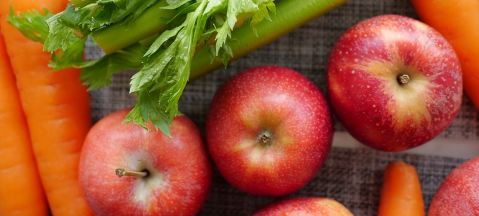Fruit and vegetables are the foundation of a healthy diet, as we know. But these days, they're sadly often riddled with toxic pesticides. Many of these pesticides have been linked to a variety of serious health problems, including brain and central nervous system toxicity, cancer and hormone imbalances. So, the more fruit and veggies you take in to be healthier - the more at risk you are of pesticide toxicity.
So, what's our strategy, since we obviously don't want to restrict our intake of fresh produce? Well, first things first: The biggest risk to your health is not eating fruits and vegetables at all. Toxins or not, eating plenty of fruits and vegetables far outweighs the risk of pesticide residues on produce. And, as we'll outline below, there are ways to avoid your exposure to pesticides too.
The Environmental Working Group (EWG) has written a Guide to Pesticides, which is designed to help you reduce your pesticide exposure as much as possible. Every year, they publish their "Dirty Dozen," a list of the fruits and vegetables they claim have the highest amount of pesticides.
(According to EWG’s analysis of test data from the US Department of Agriculture, each of these foods tested positive for a number of different pesticide residues and contained higher concentrations of pesticides than other produce.)
These are the fruits and veggies that you should try to buy organically, to avoid the pesticide residues altogether.
EWG's Dirty Dozen for 2019
- Strawberries*
- Spinach*
- Kale*
- Nectarines
- Apples*
- Grapes
- Peaches*
- Cherries*
- Pears*
- Tomatoes*
- Celery
- Potatoes
The EWG also publishes a list of the "Clean 15" – the produce that generally had less pesticide residue. Since it's difficult to eat a fully organic diet, the "Clean 15" are those fruit and veggies you're less at risk of pesticides from, and therefore may not feel you need to buy organic.
EWG's Clean Fifteen for 2019
- Avocados
- Sweet corn
- Pineapples*
- Frozen sweet peas
- Onions
- Papayas*
- Eggplants
- Asparagus
- Kiwis
- Cabbages*
- Cauliflower
- Cantaloupes
- Broccoli*
- Mushrooms*
- Honeydew melons
*USDA organic extracts of these fruit and veggies can be found in all Nature’s Nutrition products.


